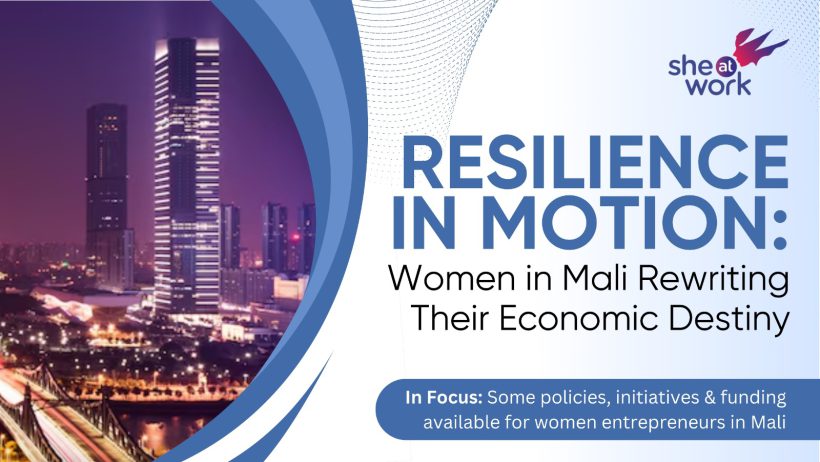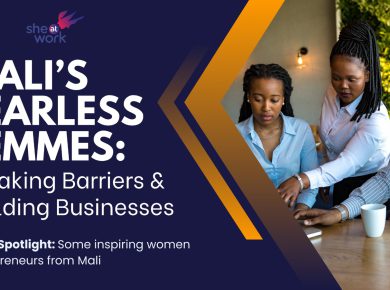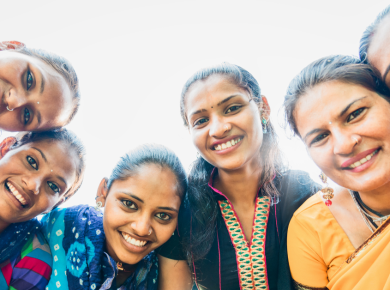In Focus: Some policies, initiatives & funding available for women entrepreneurs in Mali
#MaliWomenRise #EmpowerHerMali WomenInBusinessAfrica #EntrepreneurshipAgainstOdds #SheBuildsMali
Mali, known as “The Eyes of Africa,” is a land of rich cultural heritage, resilient people, and untapped potential, especially among its women. Let’s admit Mali has seen turbulent times. Political instability, economic setbacks, and insecurity have shaken the nation in recent years. Yet, in the midst of fragility, a new force is quietly transforming Mali’s future – its women entrepreneurs.
Against the backdrop of conflict and adversity, Malian women are launching businesses, sustaining families & building communities. From selling handmade crafts and running small scale farms to offering tech-driven services and leading cooperatives, women across Mali are not just surviving – they’re innovating.
Still, the path isn’t easy. Access to credit, limited infrastructure, and social restrictions have created blockages on the road to entrepreneurial success. But change is gaining momentum. Today, a growing number of resources are emerging to uplift and empower Mali’s women. Programs like UN Women’s initiatives, Days for Girls Enterprise, and the Malian Institute of Human Rights (MIHR) are creating impact through training, microloans, mentorship & health education. These efforts not only empower women economically, but also equip them to lead with confidence and purpose.
Government and international partnerships are also stepping in, focusing on gender equality and inclusive development. Community-based support, digital literacy drives, and financial inclusion schemes are all building blocks of a new entrepreneurial landscape in Mali – one that places women at the center.
All eyes on Mali: Women Entrepreneurs lead a new economic awakening
With the right resources and continued support, women entrepreneurs in Mali are redefining resilience. They are not just rebuilding their lives – they are rebuilding Mali’s economy, one business at a time.
As Mali writes its next chapter, the focus must remain on enabling women to lead the charge. Because when Malian women rise, communities thrive. From markets and farmlands to digital platforms and cooperative ventures, women entrepreneurs in Mali are lighting the way toward inclusive growth – turning challenges into change & instability into inspiration.
The future of Mali might be uncertain, but its women are anything but that. Let us take a look at some policies, initiatives and funding available for women entrepreneurs in Mali.
> Supported by Proparco, Banque Atlantique Mali is financing women’s entrepreneurship
Proparco and Banque Atlantique, a subsidiary of Morocco’s Banque Centrale Populaire (BCP) Group, work to promote the allocation of loans to Malian SMEs mainly owned by women.
They had signed an agreement, which was part of the implementation of the financing program called “Women’s Entrepreneurship, Banque Atlantique is Committed”, launched in March 2020.
Through this agreement with AFD Group, Banque Atlantique has committed to finance development projects led by women in all sectors. Now, it is working to promote women’s entrepreneurship, convinced that is a driver for development, growth, financial inclusion and innovation.
Launched in May 2019 with support from the European Union, European Development Fund and African, Caribbean and Pacific Group of States (ACP), the EURIZ guarantee aims to facilitate access to credit for MSMEs and help them play their essential role in economic growth and job creation.
> Mali FFSWE (Finance for Food Security and Women Entrepreneurs)
The efficient goals of the FFSWE project are – to create a more robust agricultural financial sector in Mali and to fully utilize USAID’s Development Credit Authority (DCA) guarantee.
Led by International Executive Service Corps (IESC), FFSWE will expand access to credit to actors in various value chains in the agriculture sector as well as to women entrepreneurs and associations by building their capacity to become credit worthy borrowers.
The project will also strengthen DCA Partner Banks, BICIM Mali and Bank of Africa Mali’s capacity and willingness to loan to the agriculture sector, to women entrepreneurs and associations, and to Microfinance Institutions (MFIs) who lend to these two groups throughout the DCA program life.
NCBA CLUSA’s role is to support the first objective by mentoring and advising loan recipients, especially women entrepreneurs to help grow their operations in the post-loan investment environment. NCBA CLUSA will provide cooperative business development training to farmers and herder groups as an additional service to the loan access.
Accessing Finance
Income and sustainable livelihoods are the centerpiece of NCBA CLUSA’s approach to development. They focus on training, improving governance and linking to markets that build assets and allow producers, entrepreneurs and local cooperatives and businesses to succeed.
> INCLUDE Knowledge Platform
In July 2020, NABC officially launched a new programme focused on increasing women entrepreneurship in Mali – an initiative of the INCLUDE Knowledge Platform. Together with the Mali Investment Promotion Agency (API Mali) and the IHEM Institute for Advanced Studies in Management (Institut des Hautes Etudes de Management), NABC researched for evidence and insights on barriers and solutions to women entrepreneurship, and develop ideas and tools for enhancing the environment for women entrepreneurship in Mali.
Although the government of Mali has initiated policies and ratified international treaties and conventions relevant to women empowerment, barriers to women entrepreneurship still have to be adequately addressed. Plus, due to limited evidence of the specific barriers and isolated implementation of interventions to address these barriers, it is difficult to evaluate challenges with current policies and learn from them. The aim of this APD is – to create a dialogue platform for researchers, practitioners and other actors in Mali involved in the women entrepreneurship ecosystem.
The objectives are:
- Establish a network of stakeholders on women entrepreneurship Mali.
- Identify, map and evaluate policies and programmes on women entrepreneurship.
- Enhance the understanding of obstacles that different women face in entrepreneurship.
- Provide reliable research evidence on women entrepreneurship in Mali.
- Accelerate the reach and uptake of best practices including national-level policy making.
- Use rigorous evidence inform the formulation and implementation of new policies.
- Encourage realignment of existing policies and programmes on women entrepreneurship.
https://nabc.nl/doing-business-in-africa/programmes/increasing-women-entrepreneurship-in-mali/
> Support Fund for Business Creation by Young People (FACEJ)
The mission of the Support Fund for Business Creation by Young People (FACEJ) is to help young people in Mali who have completed technical, vocational or higher education courses to launch their own businesses. The fund also supports young entrepreneurs already in business with strong growth potential.
One of FACEJ’s key objectives is – to support at least 40% of young women entrepreneurs in creating or developing their own businesses.
The fund is implemented by the PLAN-BØRNE fonden consortium and Swisscontact.
https://www.alliance-sahel.org/en/projects/young-malian-entrepreneurs/
> CFEMA
CFEMA’s mission was – to strengthen the organizational, technical, material and financial capacities of organizations of women traders and entrepreneurs in Mali and to promote the capacities of rural women. The project targeted business women, women entrepreneurs and unemployed women living in disadvantaged rural areas.
Training was provided to women in all aspects of running an effective business and engaging with ECOWAS and the West African Economic and Monetary Union as well as mastering the basics of international trade for cross-border activities. The leadership programme enabled women to gain knowledge of various leadership aspects and the gender training workshop provided training in Gender and Women’s Entrepreneurship.
The project thus addressed Agenda 2063’s aspirations of a prosperous Africa based on inclusive growth and development that is sustainable and people-driven and which unleashes the potential of its women and youth.
> The African Women In Business Initiative (AWIB)
The African Women in Business Initiative has a Plan of Action with the following objectives:
1: Raise awareness among stakeholders and mobilize key players in the field of AWIB promotion
Under this objective, the AWIB initiative seeks to:
Conduct studies that assess the constraints and conditions for creating an enabling environment and promoting women entrepreneurial development in Africa in order to develop new and innovative approaches to address these constraints. The studies would also propose concrete actionable recommendations that will contribute to the Bank’s efforts to achieve sustainable development, Private Sector Development and Gender mainstreaming objectives.
Develop an Integrated Framework for the country’s business environment assessment of growth-oriented women enterprises for integration into the Private Sector Country Profiles and country strategy papers. This will help African countries’s Governments to adapt their policies to include specific initiatives to promote SMEs owned by women.
Sponsor and organizing relevant seminars and conferences on the topic at national, regional as well as international levels.
2: Reinforce the business support provision
In order to ensure that business support services provision is effective, appropriate and accessible to women entrepreneurs who want to either start or grow a business, the program seeks to:
- strengthen the institutional and technical capacity of the national businesswomen associations / institutions that support the emergence and growth of women-owned SMEs;
- Improve access to national, regional and international business networks by Women-owned SMEs; and
- developing the BDS market by equipping existing private sector BDS providers with appropriate skills, tools and linkages;
- Enhance ICT use and promotion of effective on-line business support and management tools provision.
In implementing these activities, the program will seek close collaboration and active partnership with existing networks and programs such as FCEM, UNIFEM, national and regional businesswomen associations in Africa, to leverage and build on their achievements.
3: Develop concrete forms of support to enterprise education and entrepreneurship development
AWIB will endeavor to develop and work with initiatives that help to foster a strong entrepreneurial culture, make self-employment attractive and enhance entrepreneurship training at all levels of schooling. Specific measures and actions include:
- Helping to design the government’s framework for entrepreneurship development programs, with special features for women;
- Promoting the development of appropriate business structures for women and develop Business Incubators attached to technical schools and universities;
- Incorporating entrepreneurship development courses in university curricula;
- Creating a Business Idea Competition – to promote learning, competitiveness and networks creation and reinforcement; and
- Assessing the feasibility of an African Training Institute Hub for Women Entrepreneurs with the aim to develop a two-way information and knowledge center.
> African Women in Tech and AI
A 3-month training course designed by UNESCO and its new Category 2 Institute, Ai Movement, and funded by the Morocco’s OCP Foundation is conducted, after which 15 entrepreneurs are selected. The training consists of a three-month long online training, followed by an intensive 2-week Summer Camp was held in July 2024 at the Ai Movement Artificial Intelligence Centre in Rabat. The women were selected from 28 African countries across the five regions of Africa.
The training aimed not only to nurture the entrepreneurs’ start-ups and build their skills, but also to create a continent-wide network of women in AI to facilitate continuous dialogue and exchange. All the start-ups harness AI and tech to provide sustainable development solutions, in line with the SDGs and the African Union’s Agenda 2063.
> Programmes under TEFCONNECT
These programmes inspire growth among women in Africa. They aim to work towards empowering entrepreneurs across Africa to collaborate, innovate, and succeed.
2025 TONY ELUMELU FOUNDATION ENTREPRENEURSHIP PROGRAMME
Through the TEF Flagship Entrepreneurship Programme, the Foundation empowers African woman in business.
Launched in 2015, the Tony Elumelu Foundation Entrepreneurship Programme is the largest African philanthropic initiative committed to empowering African entrepreneurs and entrepreneurship on the continent.
2025 Aguka Programme
The AGUKA IDEATION ENTREPRENEURSHIP PROGRAMME: The Aguka Ideation Programme is an initiative by the Tony Elumelu Foundation, in collaboration with UNDP, the Rwandan Ministry of Youth, and the European Commission, to equip young entrepreneurs aged 18 – 30 with the tools, knowledge, and networks they need to transform innovative ideas into sustainable businesses.
The programme leverages a hybrid learning model of online and in-person sessions, expert mentorship, and cutting-edge resources to empower participants.
2025 BEGREEN AFRICA Programme
The 2025 BEGREEN AFRICA Programme is targeted at supporting women who are moving into the green business environment. The ‘Green’ Curriculum ’is first-of-its kind business management training tailored to the development of green businesses.
Key objectives are: This pilot initiative will build evidence around youth entrepreneurship in high-impact green sectors, and explore the contribution of young African entrepreneurs to circular economies and a sustained green revolution in Africa
> Coordination Nationale des Femmes Entrepreneurs du Mali (CFEMA)
Several initiatives aim to support women entrepreneurs in Mali, focusing on strengthening their organizational, technical, and financial capacities.
These include the Coordination Nationale des Femmes Entrepreneurs du Mali (CFEMA) – which provides training and resources to businesswomen and entrepreneurs. The Women Entrepreneurs Finance Initiative (We-Fi) also plays a crucial role in scaling up access to financial products and services for women entrepreneurs in Mali. Additionally, organizations like the INCLUDE Platform and the APD provide evidence and ideas to address obstacles to women’s entrepreneurship and economic participation.
- Some More Initiatives in Mali
In Mali, several initiatives support women entrepreneurs. Apart from Programs like the INCLUDE Platform’s African Policy Dialogues which focus on creating a more conducive environment for women’s entrepreneurship by gathering evidence on barriers and solutions. Other initiatives, are – the FACEJ (Support Fund for Business Creation by Young People) and the CFEMA (Coordination Nationale des Femmes Entrepreneurs du Mali). And there are others like:
· CFEMA (Coordination Nationale des Femmes Entrepreneurs du Mali): CFEMA strengthens the organizational, technical, and financial capacities of women entrepreneurs and traders, particularly those in rural areas, by providing training and leadership programs.
· Mali FFSWE (Finance for Food Security and Women Entrepreneurs): This project, led by IESC, aims to improve access to credit for women entrepreneurs and agricultural value chains by building their capacity to become creditworthy.
· Orange Knowledge Programme: This programme supports women in Mali, particularly those in the Pays-Dogon region, by helping them improve their lives and uplift their communities, especially in the face of insecurity and climate change.
· Affirmative Finance Action for Women in Africa (AFAWA): This pan-African initiative, supported by the African Development Bank, aims to bridge the financing gap for women entrepreneurs across Africa.
· Women Entrepreneurs Finance Initiative (WE-Fi): WE-Fi provides funding and resources to support women-led businesses, particularly in low-income and fragile countries.










